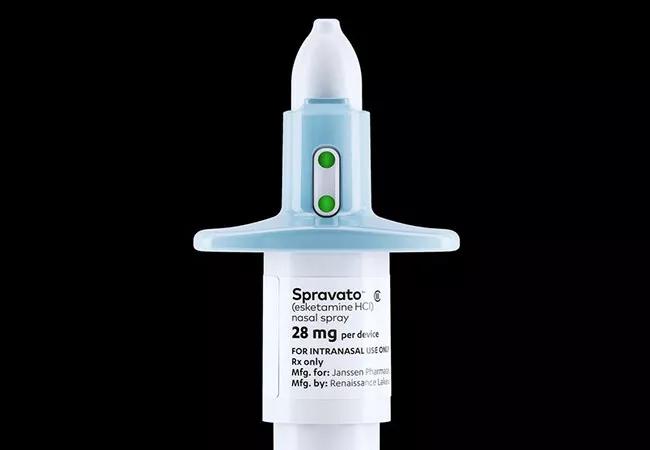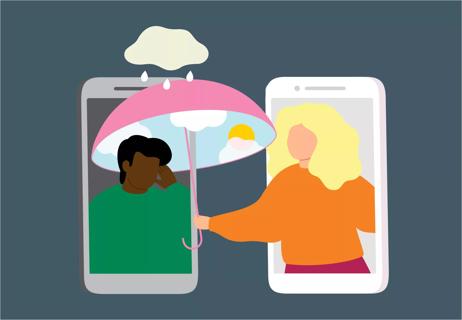The possible benefits and risks, explained

More than one in 10 Americans takes an antidepressant to help subdue the debilitating symptoms of clinical depression.
Advertisement
Cleveland Clinic is a non-profit academic medical center. Advertising on our site helps support our mission. We do not endorse non-Cleveland Clinic products or services. Policy
But for many of them, that medication doesn’t work. The feelings of sadness, lack of enjoyment, hopelessness, loss of energy, and changes in sleep and appetite can’t be shaken.
A new medication coming to the market may help these people with so-called treatment-resistant depression. It’s a nasal spray called esketamine (Spravato) that was recently approved by the FDA.
“For people who are not getting enough help from currently available antidepressants, this could be something that could be added to that and possibly get a better response, in the short-term,” says psychiatrist Amit Anand, MD, who is also Vice-Chair for Research at the Center for Behavioral Health and Director of the Mood Disorders Program.
The drug is a form of ketamine, a generic drug that’s been used as a form of anesthesia for many years, Dr. Anand says.
Ketamine has also been used for years in smaller doses in IV form for patients with treatment-resistant depression. But as a generic drug, it has not been put through FDA’s review process for that use.
It’s actually a controlled substance (it is sometimes abused as a recreational drug — you may have heard it called Special K). Because of that, and because it can create feelings of dissociation and hallucination in people who take it, the new esketamine nasal spray will only be administered in a doctor’s office or hospital setting.
Advertisement
“It’s a slightly different form of ketamine and will be given as nasal puffs, but the effects are essentially the same,” Dr. Anand says.
A patient will go to their doctor once or twice a week to get nasal puffs of a dose of esketamine. Because they may experience disorientation or confusion immediately afterward, they will stay at the doctor’s office for two hours. They are also advised not to drive, operate machinery or undertake a task which requires similar mental effort for the rest of the day.
One potential benefit of the new drug is that it’s fast-acting. People may notice a relief in symptoms within just a few hours, and it could last for several days, Dr. Anand says. Most oral antidepressants, on the other hand, can take weeks to start working.
That’s because it works in a different way from other depression drugs. “Whereas most other available antidepressants work mainly on the serotonin, norepinephrine or dopamine systems, ketamine has major effects on glutamate, which is a different neurotransmitter that is much more prevalent in the brain,” Dr. Anand says.
Beyond potential side effects, ketamine does have additional drawbacks. Though it has been used safely as a short-term anesthetic and in lower doses as a short-term antidepressant, doctors don’t yet understand whether it’s safe and effective to use over many months or years.
“This drug affects a major neurochemical in the brain, and if you interfere with that long-term, we’re not sure what the effects of that are going to be,” Dr. Anand says. “It’s also a drug of addiction, and people can misuse it or overuse it.”
There’s also no guarantee that it will work in all groups of people with treatment-resistant depression. And, like other antidepressants, there’s always the chance that it could make symptoms worse.
Esketamine was studied in five clinical trials leading up to its approval. Only one short-term trial, and its follow-up, longer-term relapse prevention trial of patients who had benefited from ketamine, produced positive results that were statistically significant, Dr. Anand says. Another study focused solely on adults over age 65 and found that benefit of treatment with antidepressants plus ketamine in that group of patients did not reach statistical significance.
Currently, for patients who are very depressed, potentially suicidal and not responding to currently available antidepressants, the next step is to offer electroconvulsive therapy (ECT) or transcranial magnetic stimulation (rTMS), Dr. Anand says. These treatments use electric currents and magnets, respectively, to stimulate nerve cells in the brain.
Advertisement
ECT is a time-tested, effective treatment which can make people come off the depression in matter of days or a few weeks. But it comes with its own set of undesirable side effects.
“You have to be put under general anesthesia for ECT, and some people complain of memory problems afterward,” he explains. “It also has a social stigma attached to it.”
Dr. Anand is hopeful that esketamine can become an easier alternative to these treatments when a quick response is required. He’s currently the lead investigator on a large multi-site clinical trial that’s testing out whether ketamine infusions are as effective as ECT therapy for these patients.
“Up until now we didn’t have anything except ECT for patients who are suffering and who are not responding to the other medicines,” he says. “Ketamine can probably give us one other option to use to get people better quickly, and this won’t involve any anesthesia and probably won’t cause any memory problems.”
Image at top courtesy of Janssen Pharmaceuticals.
Advertisement

Sign up for our Health Essentials emails for expert guidance on nutrition, fitness, sleep, skin care and more.
Learn more about our editorial process.
Advertisement

Major life events and trying times can trigger reactive depression symptoms, like prolonged sadness, irritability and hopelessness

Sitting near a light box for about half an hour a day can help treat this form of fall/winter depression

Light therapy can boost sleep and help fight depression

People with high-functioning depression may not seem depressed on the outside, but the condition can cause turmoil on the inside

More than just ‘deep sadness,’ this complex condition is often a whole-body experience

Learning your warning signs can help push back against an episode of depression

If you experience warm weather seasonal depression, you’re not alone

Cozying up with friends and family can make cold, dark days more meaningful

Even small moments of time outdoors can help reduce stress, boost mood and restore a sense of calm

A correct prescription helps your eyes see clearly — but as natural changes occur, you may need stronger or different eyeglasses

Both are medical emergencies, but they are very distinct events with different causes